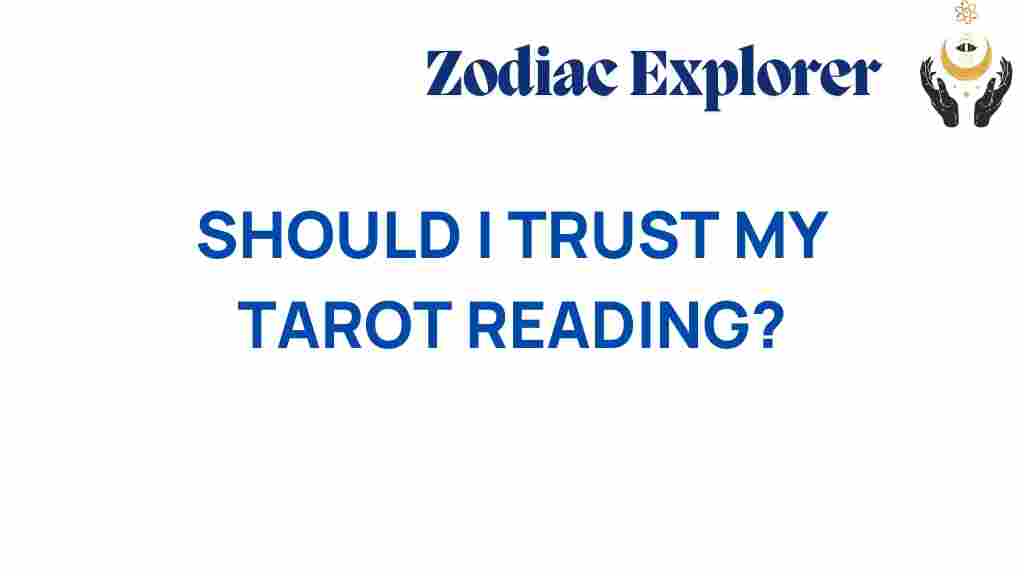The Truth Behind Tarot: Should You Trust Your Reading?
Tarot has fascinated individuals for centuries, providing a unique lens through which people explore their **spirituality**, seek **guidance**, and navigate the complexities of life. This ancient practice, often associated with **divination**, raises a crucial question: should you trust your tarot reading? In this article, we will delve into the world of tarot, exploring the role of **intuition**, the balance between **skepticism** and belief, and how tarot can serve as a tool for **self-discovery** and decision-making.
Understanding Tarot Cards
Tarot cards are more than just a deck of cards; they are a powerful tool for reflection and insight. A standard tarot deck consists of 78 cards, divided into the Major Arcana and the Minor Arcana.
- Major Arcana: 22 cards that represent significant life events and spiritual lessons.
- Minor Arcana: 56 cards that depict everyday events, divided into four suits: Cups, Swords, Wands, and Pentacles.
Each card carries its own symbolism and meaning, allowing readers to interpret them in various contexts. When you engage in a **tarot reading**, it’s essential to be open to the messages that the cards may convey.
The Process of a Tarot Reading
Engaging in a tarot reading can seem daunting at first, but it follows a simple process that can lead to profound insights. Here’s a step-by-step guide to help you understand how a tarot reading works:
- Setting the Intention: Begin by determining what you want to gain from the reading. This could be clarity on a specific situation, a decision you need to make, or general insights into your life.
- Choosing a Spread: There are various tarot spreads, each designed for different types of inquiries. Popular spreads include the three-card spread, the Celtic Cross, and the single card draw.
- Shuffling the Deck: As you shuffle the cards, focus on your intention. This act of **intuition** is crucial as it helps to connect you with the energy of the reading.
- Drawing the Cards: Once shuffled, draw the cards according to the chosen spread. Pay attention to your feelings and thoughts as you choose the cards.
- Interpreting the Cards: Reflect on the meanings of the cards and how they relate to your question. Consider both traditional interpretations and your personal intuition.
- Reflecting on the Reading: After interpreting the cards, take time to reflect on the insights gained. How do they resonate with your life and current circumstances?
Can You Trust Your Tarot Reading?
The question of trust in tarot readings often hinges on personal beliefs and experiences. Here are some factors to consider:
1. The Role of Intuition
Many tarot readers emphasize the importance of **intuition** in their readings. The cards can serve as mirrors, reflecting your inner thoughts and feelings. Trusting your intuition can enhance the reading experience, allowing you to connect deeply with the messages conveyed.
2. The Influence of Skepticism
While some people approach tarot with an open mind, others remain skeptical. This skepticism can stem from a lack of understanding of how tarot works or a belief that it is purely a chance-based system. However, even skeptics can find value in tarot as a tool for **self-discovery** and contemplation.
3. The Nature of Guidance
Tarot readings provide guidance but do not dictate your fate. They can illuminate possibilities and offer perspectives that may not have been considered. Ultimately, the decisions you make are yours, and the reading serves as a supportive tool in your journey.
Benefits of Tarot Readings
Engaging in a **tarot reading** can offer numerous benefits, including:
- Self-Reflection: Tarot encourages you to examine your feelings and thoughts, fostering personal growth.
- Clarity in Decision-Making: Tarot can help clarify your thoughts when faced with difficult choices, providing alternative perspectives.
- Emotional Release: The process of exploring tarot can lead to emotional catharsis, allowing you to confront and release pent-up feelings.
- Connection to Spirituality: Many find that tarot deepens their connection to their **spirituality**, providing a sense of peace and understanding.
Troubleshooting Common Issues in Tarot Readings
Even with the best intentions, you may encounter challenges during your tarot journey. Here are some troubleshooting tips:
1. Feeling Overwhelmed by the Cards
If the number of cards or their meanings feels overwhelming, start with a simple three-card spread. Focus on one card at a time, allowing yourself to absorb its message before moving on to the next.
2. Difficulty Connecting with Your Intuition
Sometimes, you may struggle to connect with your **intuition**. In these moments, try to meditate or practice mindfulness before your reading. This can help clear your mind and enhance your intuitive abilities.
3. Interpreting Confusing Messages
If a reading feels confusing or contradictory, remember that tarot is not always straightforward. Take a step back and consider the broader context. Journaling your thoughts can also provide clarity as you reflect on the reading over time.
Conclusion: Embracing Tarot as a Tool for Self-Discovery
In conclusion, the question of whether to trust your tarot reading is ultimately a personal journey. Tarot can serve as a valuable tool for **self-discovery**, offering insights and guidance as you navigate life’s complexities. By embracing your **intuition**, balancing **skepticism** with openness, and using tarot as a means to explore your thoughts and feelings, you can unlock its potential for meaningful transformation.
Whether you are a seasoned tarot reader or a curious newcomer, remember that the cards are a reflection of you and your experiences. Trust in the process and allow tarot to guide you on your path of **spirituality** and **decision-making**.
For those interested in exploring tarot further, consider checking out our detailed guide on understanding tarot spreads to enhance your reading experience. Additionally, for a deeper dive into the world of divination, visit The History of Tarot.
This article is in the category Myths and created by ZodiacExplorer Team
